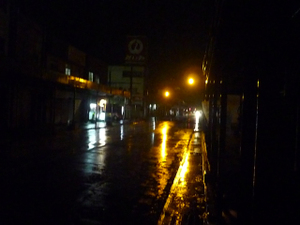【和訳に挑戦!】Economic Gardening(その3)
わ~い!これぞ「ケムトレイル」だ~~。
(「ケムトレイル?、なにそれ?」という方は、検索をしてみてください)
で、夜には本格的な雨。

確かに、地上の広範囲に微小物質を散布するには格好の気象条件であった・・、
ということになりますよね・・・?
・・・(*_*;。オッホン。私たち、地上に這いつくばって活きる者。
はるかな上空で行われていることなぞ、「そんなの、知るか~~!!!」
(笑ってくださいナ)
さてさて、「一年の計」に立ち返って。
・【和訳に挑戦!】Economic Gardening(その1)
・【和訳に挑戦!】Economic Gardening(その2)
挫折しつつあったのですが、ナルホド。「The recruiting 」を「企業誘致」と
訳せれば、その先に進めます!!<m(__)m>。
続きです。
『Further, we had a sense that successful recruiting programs existed primarily
in those areas that were attracting new businesses any way, regardless of whether
they had an economic development program. For every successful recruiter who
represented a hot office/industrial park in a major metropolitan area, there were
literally hundreds of economic developers in rural areas, inner cities and small
towns who struggled without much real success.』
(さらに、ニュービジネスを惹き付けるまでに成功した企業誘致の事例は、その地域が
経済計画を持ち合わせていたか、否か、には関係ないと思っていました。大都市において、
活発なオフィス・工場を成功させた起業家の陰には、地方都市・農村において起業を志した
多くの人の奮闘があります。)
『There was another, darker side of recruiting that also bothered us. If an outlying
area was successful at attracting new industry, it seemed to be a certain type of
business activity: the branch plant of industries that competed primarily on low
price and thus needed low cost factors of production. Rural towns with cheap land,
free buildings, tax abatements, and especially low wage labor would "win" these
relocating businesses. Our experience indicated that these types of expansions
stayed around as long as costs stayed low. If the standard of living started to
rise, the company pulled up stakes and headed for locations where the costs were
even lower, often Third World countries.』
(もうひとつ、「企業誘致」には否定的な側面があります。地方が企業誘致に成功した
ケースとは、一定のパターンがあるように思えてしまいます。価格競争の中で、少しでも
生産コストを切り詰める必要に迫られた業種。安い土地代、空き工場、減税措置、なにより
も、安い労働力が自慢の自治体は、企業誘致に“成功”します。私たちの経験によれば、生
産コストが低く抑えられている限りは、その工場は操業し続けます。しかし、地元住民の暮ら
しが良くなり始めた途端、その企業は、さらにコストを低く抑えることが出来る、例えば第三
世界へと、移転していきます。)
『This was the world then when we proposed another approach to economic development:
building the economy from the inside out, relying primarily on entrepreneurs. We knew
it wouldn't be glamorous work nor work which would get 40-point-type headlines. But we
sensed that if we could develop a solid alternative model, even if it took years to
implement that model, we would make a valuable contribution to communities all over
the world.』
(そんな世界の現状を省みて、私たちは、地域に根ざした経済開発を提唱することとなりました。
それは、新聞の見出しを40ポイントの大きさで飾るような派手なことではなく、とても地味なこと
であること、覚悟していました。しかし、「企業誘致」に代わる経済成長策が、例え長い年月を
要して現実化するものだとしても、それが、全世界の自治体の見本になる、と信じていました。)
『After two years of formulating and developing the idea, we launched economic gardening
with the simple concept that small, local companies were the source of jobs and wealth
and that the job of economic developers should be to create nurturing environments for
these companies. Since then we have often compared our experiences to Alice following
the rabbit down the hole to Wonderland. It has been a long journey with many bends and
twists in the road and one that has been full of constant surprises.』
(「エコノミック・ガーデニング」の概念、地元企業の雇用・富の創出力を活かした地域活性化
策を、より説明しやすくするために、2年を要しました。それは、(不思議の国の)アリスが、
うさぎを追いかけたばかりに異次元へと転がり落ちたような、紆余曲折と驚きの連続でした。)
・・・・・ゼエゼエ・・・・・。


コメント